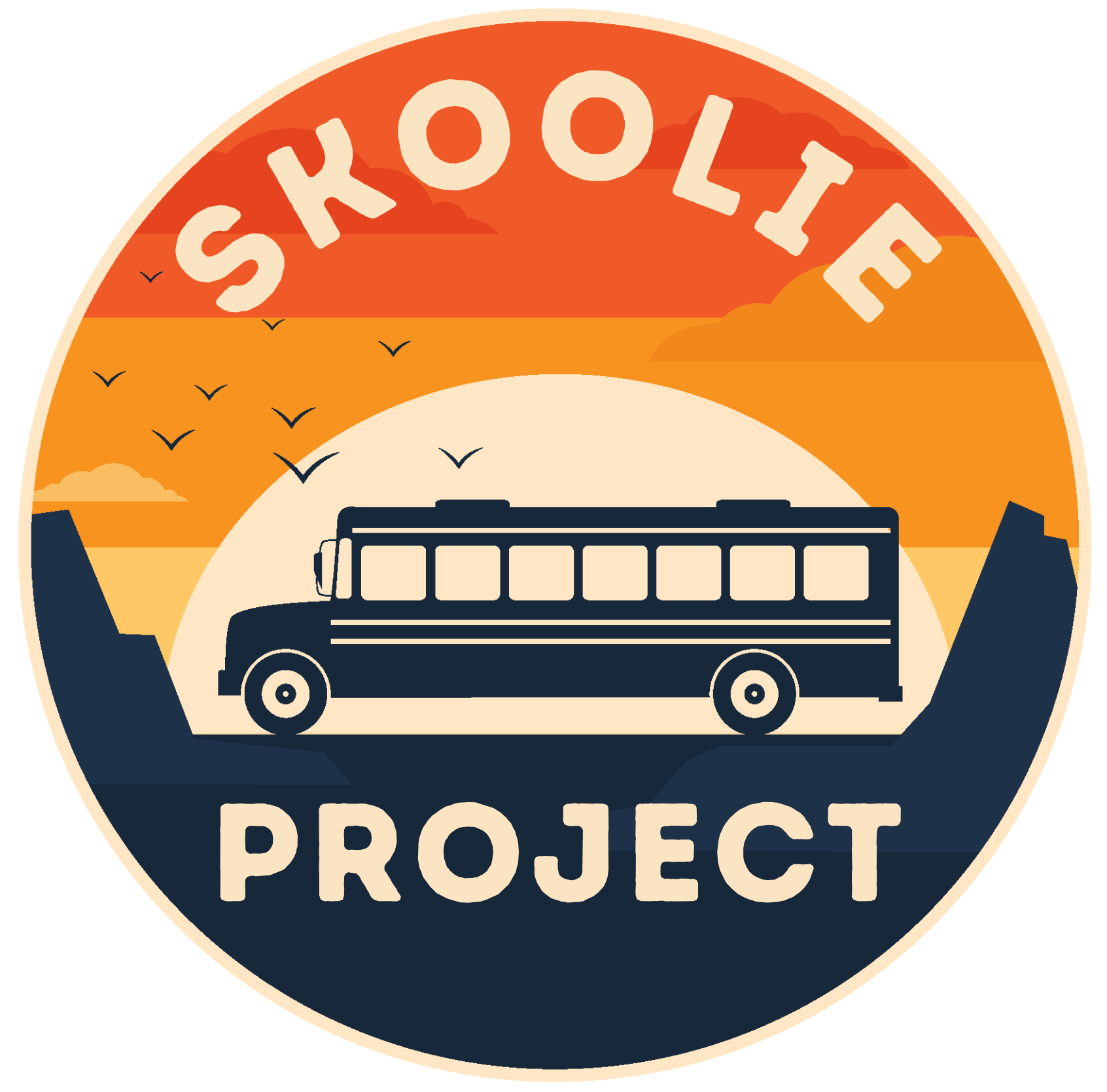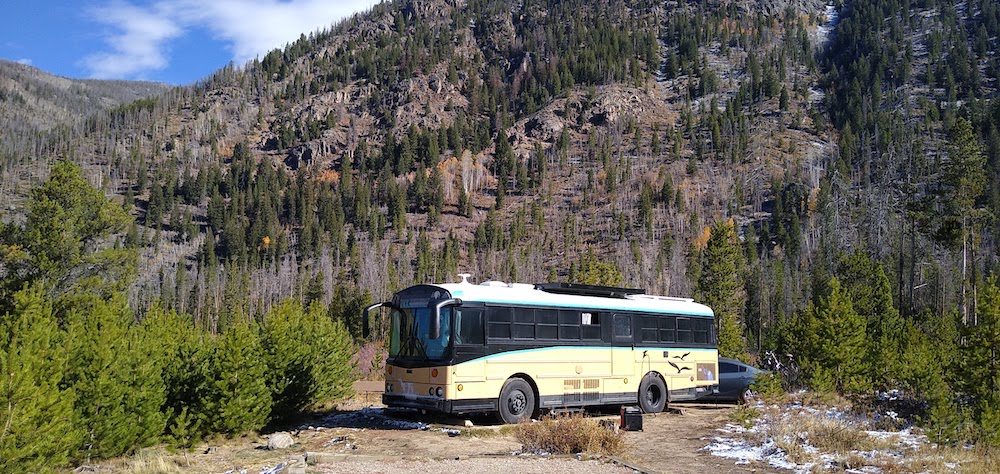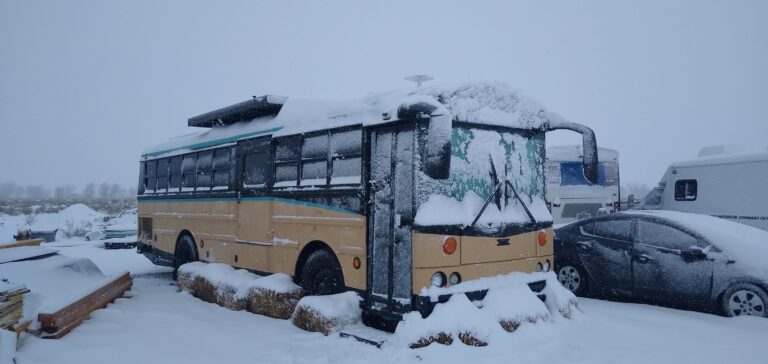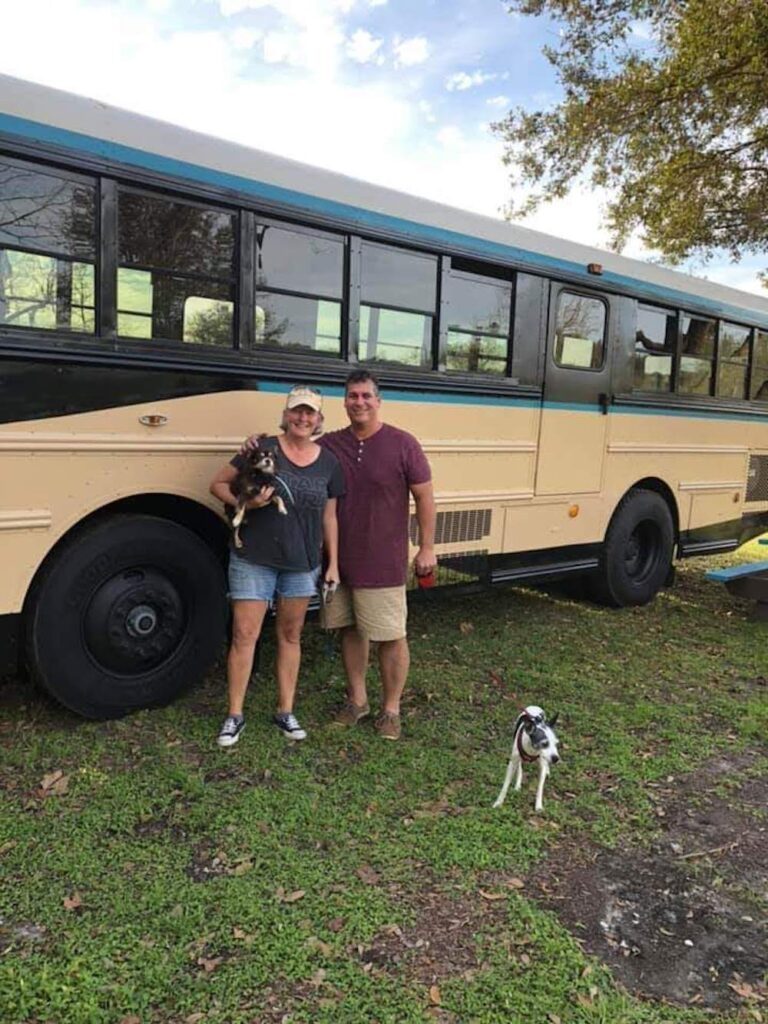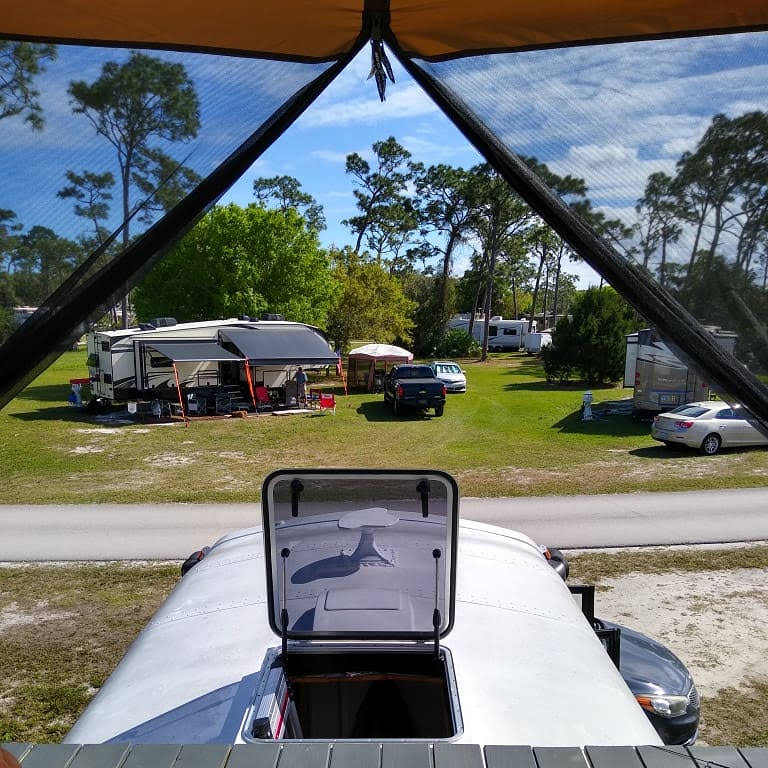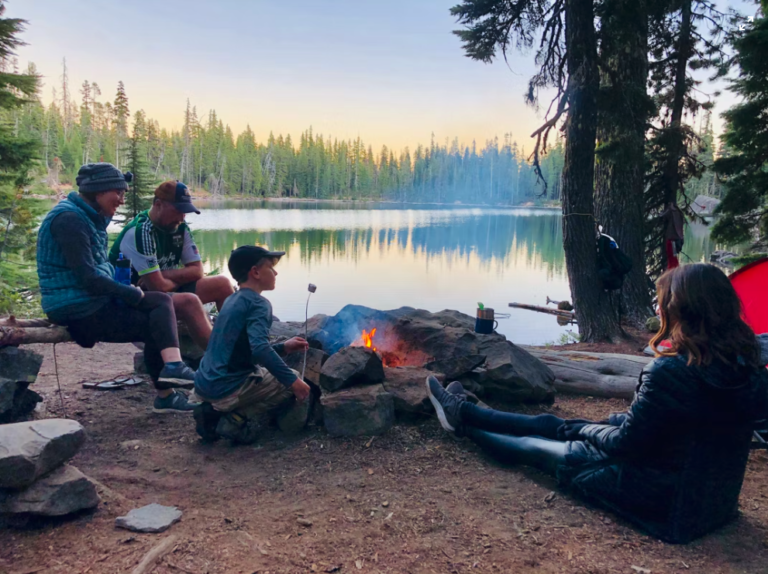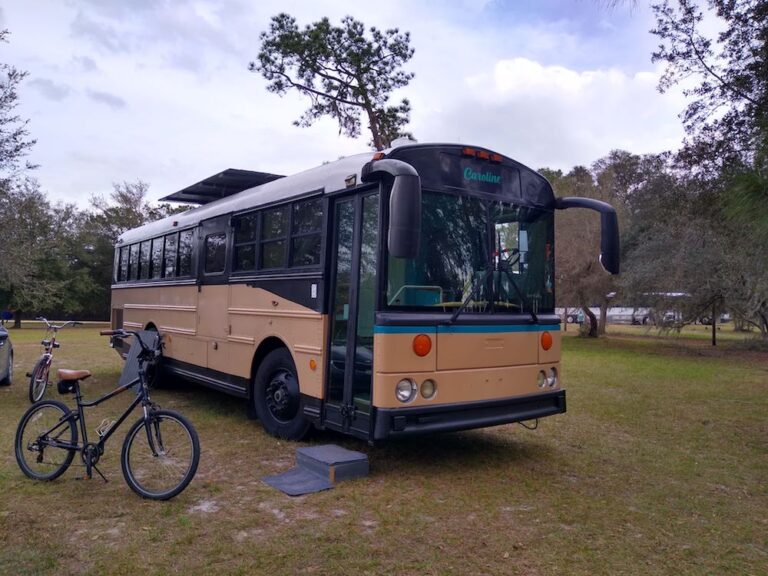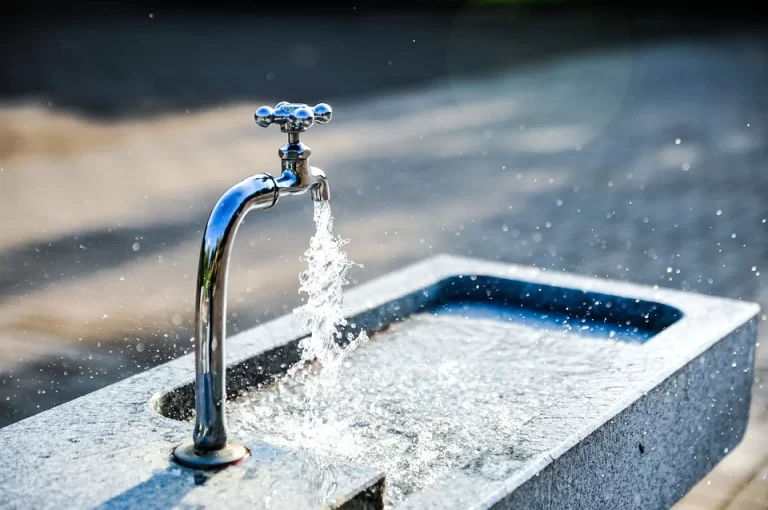Can You Boondock In A Skoolie?
One of the most common themes for our vision of living and traveling in a skoolie is parking somewhere deep in a National forest, out in the desert, or on a desolate beach somewhere. People who don’t understand what a skoolie is, often ask, “Can you boondock in a skoolie?”
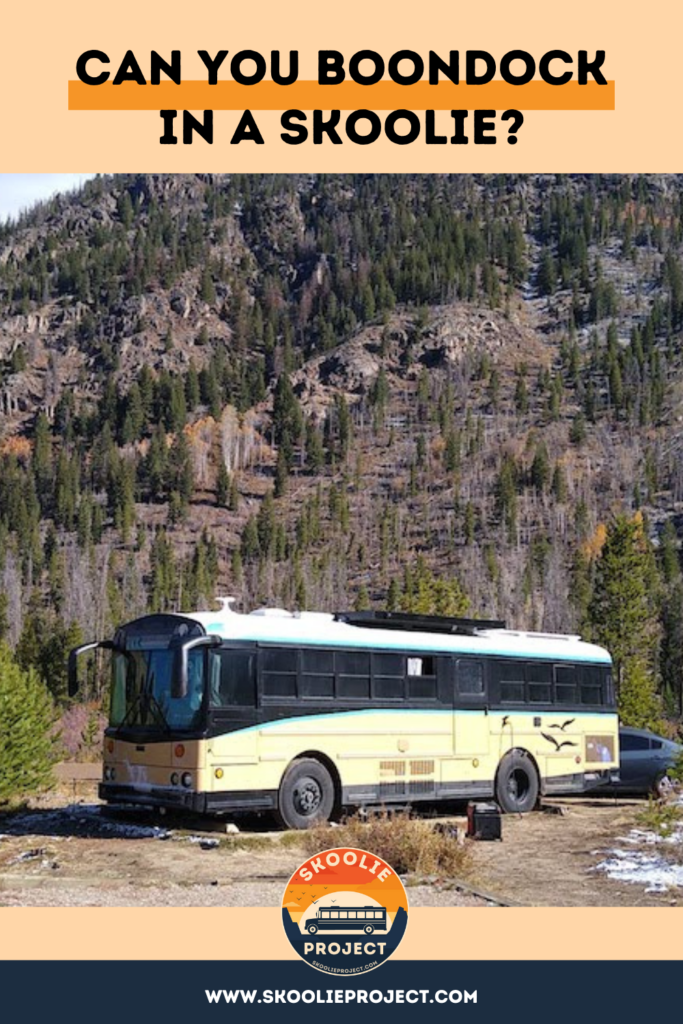
The simple answer here is, why wouldn’t you boondock in a skoolie?
The peacefulness of listening to our Earth’s natural sounds with no one nearby to disturb it or you. It is an essence of tranquility unmatched by anything we have ever experienced in a single instance.
To be able to successfully and comfortably boondock in a skoolie, there are some guidelines of common sense, learned behavior, and equipment needed.
Today, we are going to examine what it takes to boondock in a skoolie and want to do it again and again.
What Is Boondocking?
Boondocking, in its simplest definition, is parking or camping overnight in a location that does not provide or does not utilize electrical or freshwater hookups.
It is possible and many people do it every day all over the place to boondock in friends and families driveways, RV, State and National parks, and many other places that provide shore power and water.
So, regardless if you are off somewhere in the desert, the backcountry of the Canadian Rocky Mountains, or a Walmart parking lot somewhere off of Interstate 10, you could be boondocking in your skoolie.
The most epic thing about boondocking in your skoolie is that you are self-sufficient and not immediately relying on others for your basic and comfort needs.
No need for pre-planning on where to park and making reservations with Harvest Hose or RV parks. You park where it is safe and legal to do so.
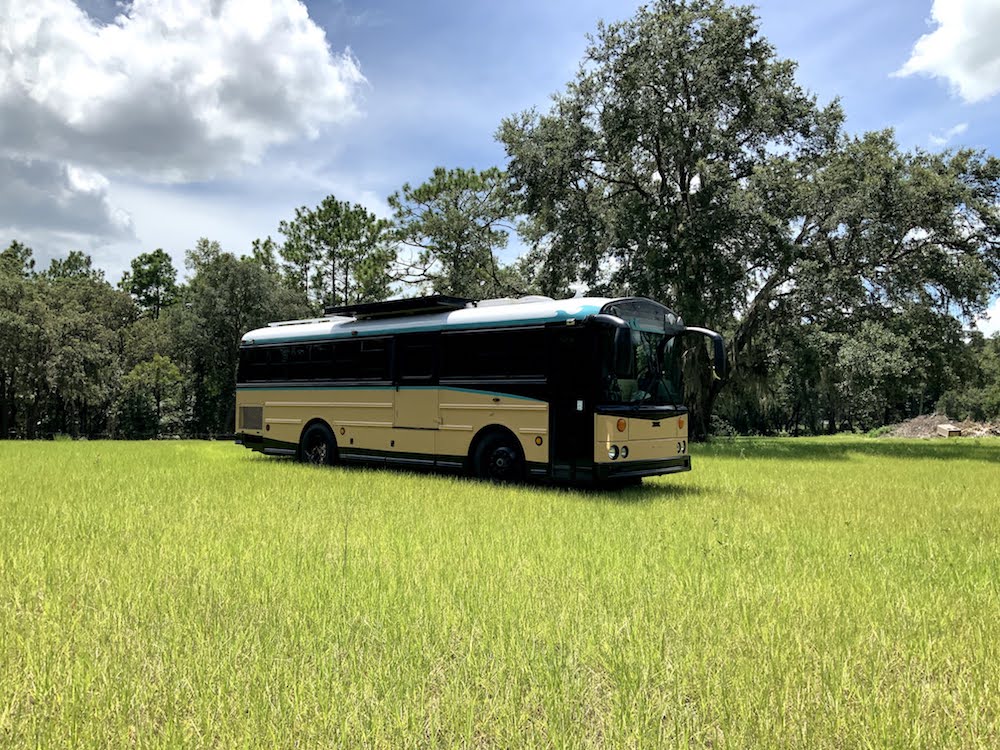
Why Is It Called Boondocking?
Like so many words and phrases in the English language, boondocking originated from an experience in our history that has crossed over into our mainstream and everyday language.
Boondock or boondocking is the combination of two words that have melded into one.
“Boonies” is a term that refers to a location that is so far off the beaten path that no one would be able to locate it. The boonies is nowhere near any town or city. It is a location far removed from other people that it is referred to as “out in the boonies”.
“Boondocks” is a word that is derived from the Tagalog word “bundók” which means “mountains”.
Boondocks was adopted and brought back to the United States by American soldiers fighting in the Philippine-American war at the turn of the 20th century.
Thus, when someone refers to the noun form expression of parking or camping in the boonies or the boondocks, they are just referring to the verb form of boondocking.
Where Can You Boondock In Your Skoolie?
You can boondock in your skoolie anywhere you want. Now, if you want to know where you can boondock in your skoolie legally, that requires a more complicated and in-depth answer.
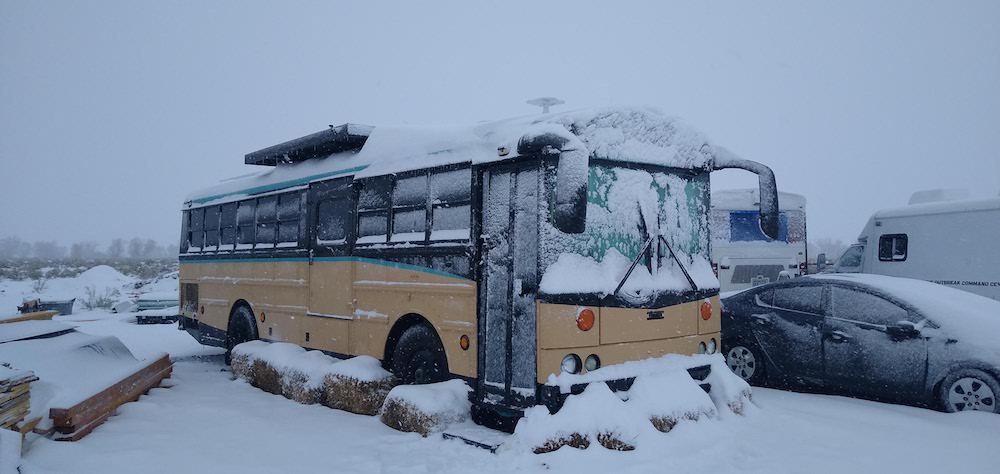
Boondocking in your skoolie or any other vehicle for that matter is restricted only by local, state, and Federal laws that govern overnight parking and sleeping in your vehicle in a specific or general location.
Examples of illegally boondocking in your skoolie would be in a city, town, or area that has written law, posted or otherwise, that prohibits overnight parking anywhere within a geographical location, overnight and sleeping.
Some state and national parks have restricted areas that prohibit overnight parking and sleeping in vehicles.
Even some rest areas along our state and federal highways prohibit overnight sleeping in a vehicle.
Always check ahead of time if you are planning on sleeping overnight in your skoolie with the local or appropriate authorities. Otherwise, you risk the dreaded “knock knock knock” on your door or window in the middle of the night and being questioned by the authorities.
No one wants that or has time for that!
We have never had “the knock” and it is our goal to never experience it or that conversation with a police officer.
Places you are allowed to safely and legally boondock in your skoolie are dispersed camping lands and BLM designated land. National Forests as long as you are not blocking a road, byway, entrance, or exit.
Anywhere that does not violate any federal, state, or city ordinances.
Boondocking is one of the main reasons we chose a skoolie over a conventional RV. To have the ability to camp and travel without the need to hook up or connect to any grid.
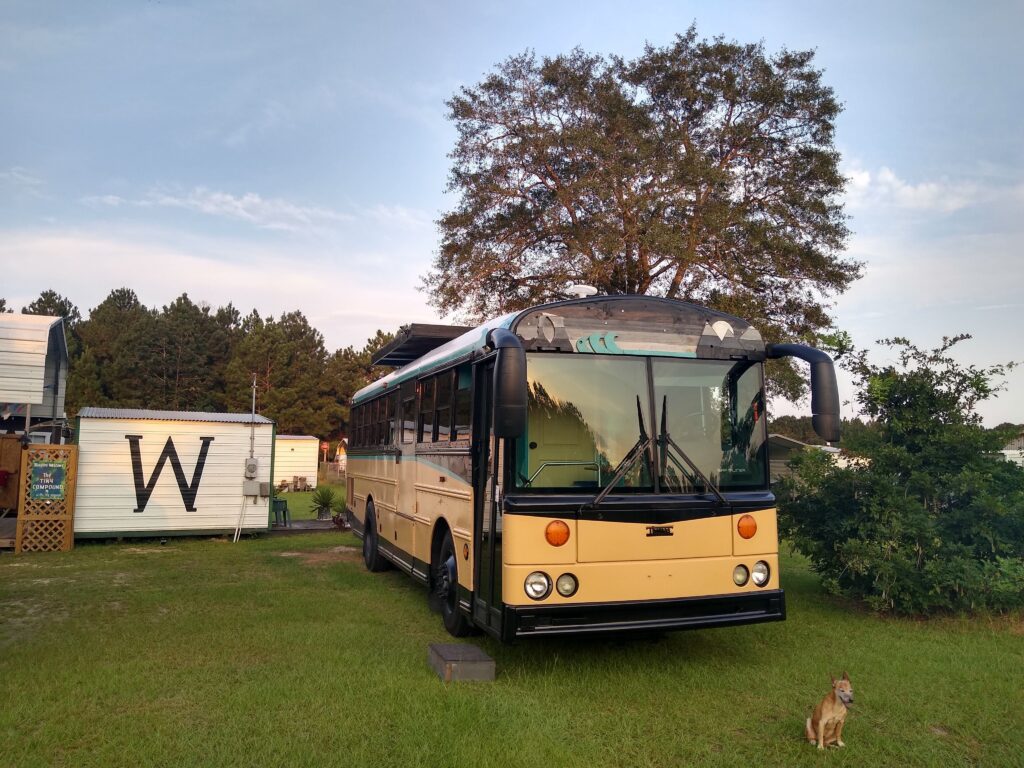
Where Can I Park My Skoolie For Free?
There are literally hundreds of places you can park your skoolie for free. Understand however that “free” does not necessarily translate to legal.
There seems to always be a camper, RV, skoolie, or van that is camping at the local Walmart. Regardless of the fact that most Walmarts now have signs prohibiting overnight parking.
We wrote a blog post on Free Skoolie Camping. There we talk about a lot of places where you can park and sleep overnight for free. Most are legal and most of them we have actually done ourselves.
There are some places where you can technically park for free. You just have to be a member of a club or organization to do so.
We are referring to Boondockers Welcome and Harvest Hosts. The two companies have actually and recently merged into one business. For an annual membership fee, you are entitled to hundreds of “free” overnight parking at establishments all over the country.
We are currently members of Harvest Hosts and have used them several times. It has always been a safe and pleasant experience for us. We have stayed at wineries, farms, breweries, and restaurants.
We have always felt welcome and safe while parking at a Harvest Host.
There is a caveat to the “free” parking, however. You are expected, as a social grace, to patron the establishment and purchase an item from them. Whether that be a bottle of wine, a meal, or some produce, it is a gesture of gratitude.
We have found it to be worth it. Although, we are not sure we will renew our membership in the coming year. We know of so many other free parking alternatives. The $99 membership is something we would rather utilize somewhere else.
Is Boondocking Illegal?
Boondocking is legal. It is encouraged in fact. There are millions upon millions of acres of land managed by the Burea of Land Management. They offer land for US citizens to camp for free throughout the year.
The Bureau of Land Management has even provided free maps to citizens. This helps us find locations of places to explore and camp.
Not only can we enjoy basic camping, but there are also bike and hiking trails. Enjoy off-road vehicle trails, climbing as well as hunting and fishing areas specifically designated for such activities.
With that being said, there are places around the country where boondocking is discouraged as well as flat-out prohibited.
Where ever you plan on parking for a night or a few nights, always do yourself the service of checking ahead to ensure where you are going to be boondocking is safe and legal to do so.
How Long Can You Boondock In Your Skoolie?
When boondocking on BLM land, the typical stay allowed is no more than two weeks or 14 days. Most locations will have a sign or information available to campers specifying the allowed length of time for camping.
Once your allotted time is up, most locations require you to leave for a specified amount of time. There may also be a distance from your current camping spot you have to travel as well.
Once you have moved, the timeline starts all over again. You can continue to camp and move for as long as you want or have the supplies to do so.
What Supplies Do You Need To Boondock?
When boondocking, regardless of your location, supplies, and preparedness are the keys to longevity and comfort.
Here are some of the essential items or supplies that will enable you to successfully and comfortably boondock.
Water
We all know that water is the key to life and survival in any situation. No one would be able to survive in a hospital without water for a few days. Dehydration is subject to all of us and without clean potable water, we would not last very long.
Having a freshwater tank is a great start to boondocking. However, unless you have the means to filter water into safe drinking water
Food
Food goes hand in foot with water. Granted we can last twice as long or more without food than we can water, we must have proper nutrition in order to effectively function.
Having the ability to store food is a key element in how long you can boondock.
Power
Not exactly the type of supplies you would consider for camping. Without power, you are limited to what you are able to do and how long you can do it comfortably.
Having the power to charge your cell phone, GPS, and emergency weather radio are a few key elements for safety.
Besides the safety aspect of using power or electricity, keeping perishable food cold will prolong its shelf life as well.
Warmth
Being able to stay warm is a key element for boondocking. If you are camping in cold weather and your body is losing heat faster than it is able to produce it, you will run the risk of hypothermia.
Hypothermia exists when the human body’s temperature reaches 95’ F or 35’ C.
Fans for cooling
While being able to stay warm is essential, being able to cool your body is almost equally important. Having fans will make your boondocking experience much more comfortable.
If you have enough solar and battery bank to run an air conditioner, then all the more power to you.
Cell Phone Signal
A cell signal is not only essential for emergencies, it's also nice to feel connected to the outside world. It is more of a psychological assurance and security.
Besides, how would you watch The Mandalorian or The Big Bang Theory without a solid cell phone signal for wifi?
First Aid Kit
Having a simple, but adequate first aid kit could mean the difference in prolonging your boondocking experience and a trip to the nearest emergency room.
First aid for reptile bites, venomous insects, burns, or cuts is essential to your safety. Never go camping without a good and reliable first aid kit.
Basic Electric For Boondocking In A Skoolie
There are a couple of different ways you can approach an electrical system while boondocking in your skoolie.
Solar For Boondocking In Your Skoolie
Having a decent solar array with house batteries to power your electrical needs is the preferred method for powering your electronics while boondocking.
Depending on where you are camping, the sun can be your friend or an aloof friend who occasionally shows up only to quickly disappoint you again.
If you have house batteries, a solar array, and sunshine, you have the ability to power your electricity.
Solar Generator For Boondocking In Your Skoolie
If you were to opt out of a traditional solar system, but still want to have an electrical off-grid system for powering a modest amount of electronics, a solar generator may be a good option for you.
We are not going to go into a deep solar generator review here. You can read about a few options available in a post we wrote on Skoolie Solar.
The three most popular solar generators are:
- Goal Zero
- Jackery
- Bluetti
You can get a good selection of different sizes and power with each brand.
We had a Bluetti 2000w Lithium-Ion solar generator. We found we did not use it enough. Wo we ended up selling it to have more space in our Sprinter conversion.
They are great as a backup or alternative power station. We could not see any of them as a viable solo option for a normal person and power needs.
Basic Plumbing for Boondocking In A Skoolie
Plumbing and boondocking is an easy one, at least for us. Basic plumbing for us is at least 55 gallons of fresh water. Add a water pump, a Berkey for freshwater, and a shower to stay clean and fresh.
Basic for someone else may mean some Jerry cans of water and a foot pump.
As long as you have a means of collecting water and filtering it for drinking and meals, then you are golden.
From there, it is simply how bougie you want to be.
What Is The Difference Between Boondocking and Dry Camping?
There is no difference between boondocking and dry camping. Both terms are interchangeable and mean the exact same thing.
There is however one slight distinction between the two terms. While they both refer to camping without any electrical, sewer, or water hookups, dry camping is typically referred to as parking in a campground without connecting to shore power or water.
Boondocking is doing the exact same thing, but in a rural and more off-grid location or environment.
Is It Safe To Boondock?
Boondocking in your skoolie is safe as long as you make it safe. Some of the best advice we give newbie skoolie adventurers is to always keep your wits about you. What that means is to have a keen awareness of your surroundings.
Situational awareness is a basic survival skill preached and engrained into soldiers, law enforcement, and survivalists. Without an awareness of their surroundings, many people have found themselves in a world of hurt because they were not mentally prepared for the unexpected.
It is safe to boondock in your skoolie? Yes, it is extremely safe, just be smart about it.
We will cover some safety tips and strategies on boondocking, camping, traveling, and living in your skoolie more in-depth later.
Boondocking In Remote Locations
Boondocking often involves parking and camping in remote locations where cell phone signal is sparse or absent altogether.
If something goes sideways, you may be too far away before you can get to a place for help.
When boondocking in remote locations, do not be careless or take unnecessary risks without proper precaution. This is especially true if you travel and are camping alone.
When camping in the wilderness, keep your small children and pets always at arm’s length. There are wild animals who would not think twice about snatching up your child or pet. Then taking it back to their den or nest for the days’ nourishment.
Don’t mean to sound so graphic or grim, but that is the reality and bittersweet harshness of nature.
Boondocking In Urban Locations
If you are wanting to be stealthy and camp in an urban location, then there are other variables to consider.
First of all, know the environment and neighborhood you are going to be parking in overnight.
There are legal issues as well as safety concerns that could come into play. If anyone ever approaches your bus, or whatever vehicle you may be boondocking in, do not approach or allow them access to your rig.
Unless it is law enforcement, it is best practice to get in the driver’s seat and leave the area immediately.
People who are homeless, drunk, or just crazy are too unpredictable. You may be able to physically handle and “win” the situation, but end up in legal trouble that could cost you thousands in legal fees and too much time.
Wrap Up – Can You Boondock In A Skoolie
We can not imagine living and traveling in our skoolie without the ability to comfortably and safely boondock.
To us, it is the quintessential expression of freedom and living without boundaries.
We were unable to comfortably boondock while traveling in our first skoolie project. We vowed to one another, that any other DIY conversion we ever built again would have a solar system array.
We would be proud and very comfortable with powering all of our wants and needs.
To us, aside from water and heat, boondocking is like living in a post-apocalyptic world without electricity. Maybe we have become a little spoiled?
We would love to hear your idea of boondocking and some of your experiences. Leave us a comment below so others can learn from your wisdom.
We look forward to connecting with you!
